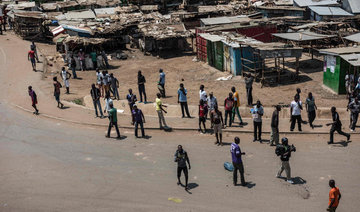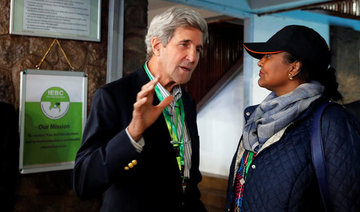NAIROBI: Kenya’s President Uhuru Kenyatta was declared the victor Friday of an election which rival Raila Odinga claims was massively rigged, sparking angry protests in isolated opposition strongholds.
According to the election commission (IEBC) Kenyatta won the presidential race with 54.27 percent to rival Raila Odinga’s 44.74 in Tuesday’s election, handing him a second term at the helm of the region’s richest economy.
While celebrations erupted in Kenyatta’s strongholds, angry residents of Odinga’s bastions took to the street in the western city of Kisumu.
In the Nairobi slum of Kibera angry supporters attacked and looted businesses which appeared to belong to members of Kenyatta’s Kikuyu ethnic group, an AFP photographer said.
Odinga, 72, has now lost three elections he claims were stolen from him.
In 2013 he took his grievances to court but in 2007 — a poll many observers agreed was riddled with irregularities — the result sparked two months of ethno-political violence that left 1,100 dead and 600,000 displaced.
After being declared the victor, Kenyatta reached out to Odinga and his supporters, to “work together... so that we can build this nation together.”
“We are not enemies. We are all citizens of one republic. As with any competition there shall always be winners and there shall be losers but we all belong to one great nation of Kenya,” he said.
“Let us be peaceful... there is no need for violence. We have seen the results of political violence. And I am certain that there is no single Kenyan who would wish for us to go back to this.”
Boycott
The National Super Alliance (NASA) opposition coalition refused to take part in the announcement of results, which came just hours after they had requested the IEBC hold off until their concerns had been addressed.
“We are not going to be party to it, our issues have not been addressed,” said top NASA leader Musalia Mudavadi.
“We have raised some very serious concerns, they have not responded to them. The chairman told us... they will respond to us after the event,” said Mudavadi.
Another top NASA official James Orengo denounced the counting process as “an entire charade, this is a disaster.”
Orengo also rejected calls from foreign observers to turn to the courts with their grievances.
“Going to court for us is not an alternative. We have been there before. It’s not an alternative,” said Orengo.
“Everytime an election has been stolen, the Kenyan people have stood up to make sure that changes are made to make Kenya a better place.”
US Ambassador Bob Godec earlier joined foreign observers in urging parties to use legal means to deal with their grievances.
“Violence must never be an option. No Kenyan should die because of an election. Kenya’s future is more important than any election. Leaders above all need to make that clear,” Godec said.
Six people have died in election-related violence, including two protesters in Nairobi shot dead by police on Wednesday.
Also on Wednesday men armed with knives attacked a tallying center in the southeast of the country, stabbing one IEBC officer who later died. A police source in the region said two attackers were shot dead and a civilian died after being hit by a stray bullet.
Odinga had called for calm from his supporters before the announcement, but added: “I don’t control anybody. People want to see justice.”
Fraud suspicions
Foreign observers praised a peaceful, credible voting process, but the mood quickly turned sour when Odinga rejected the results after only a few hours of counting.
NASA has claimed both that the results were manipulated by a massive hacking attack, and that it is in possession of results being concealed on IEBC servers that show Odinga to be the rightful winner.
On Thursday they demanded Odinga be declared president on these grounds.
Results from 40,883 polling stations streamed electronically to the national tallying center in Nairobi, and then had to be cross-checked against counting forms.
NASA complained about anomalies between the forms it had seen and the electronic results with votes added to Kenyatta’s tally and subtracted from Odinga’s, and claimed some results seemed to come from polling stations which did not exist.
NASA demanded access to the IEBC’s servers, saying they would accept any result contained therein, as they remain convinced the commission has released manipulated results.
Before the election the race between Odinga and Kenyatta was seen by pollsters as too close to call.
It was billed as the final showdown between the two men whose fathers Jomo Kenyatta and Jaramogi Odinga were allies in the struggle for independence, but later became bitter rivals, setting the stage for decades of political rancour.
In his first term, Kenyatta, 55, was credited with a massive infrastructure drive and overseeing steady economic growth.
However his administration has been dogged by several graft scandals, with the country dropping six points in Transparency International’s corruption index in 2016.
























